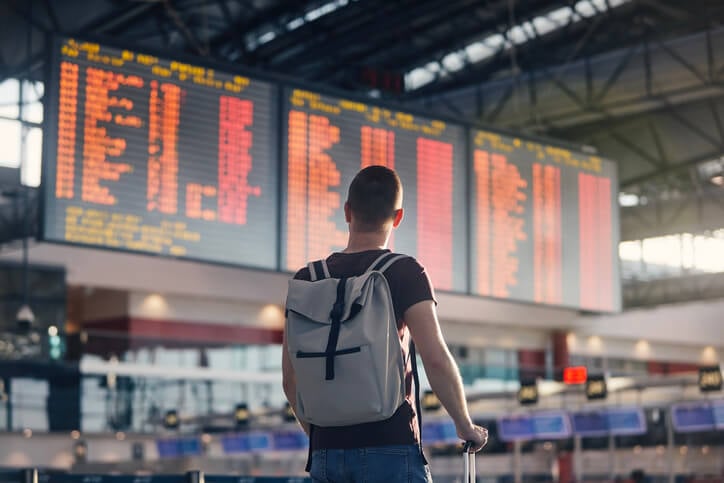Long term travel is an aspirational goal for many people. In particular, it’s appealing to those looking to change their routine and find new life experiences.
It was previously thought that long term travel primarily appealed to younger people, who may have less responsibilities holding them back. Recent data from ABTA proves this is not the case. There has been a surge in solo travel being booked by those aged 34-44 years old. You are never too old to take a career break and go and see the world!
If you are interested in planning a solo trip for an extended period of time, there are several things to consider before taking the leap. We want to help so have put together a handy guide.
Planning your trip
One of the most important things to do first is to think about where you want to go and consider what budget you’ll need to support your travels. Saving up can be a lengthy process so you may need to plan this months, if not years, in advance.
Make a spreadsheet mapping out what you can save and your savings goal overall to keep track. From this, you can map out what is generally feasible for your trip. It will also help you decide how long you will be able to fund your trip for.
Assigning a base cost per day can be handy to help you work this out. If you are travelling between different countries, it makes sense to thoroughly research the cost of standard living in each one ahead of time to know how far your money can go when you get there.
What to do with your belongings
As storage providers, we often support those taking long trips abroad. We offer home storage to keep your belongings safe and secure when you’re away. This can be a great option if you want to keep sentimental items or furniture until you return.
Flexible, pay as you go terms mean that you can store for as long as you want. So if you want to come home early or you’re enjoying your adventure so much that you want to keep travelling it doesn’t matter. Your things will be stored safely for as long as you need.
For items that will not be needed, you might consider selling these before you go to accrue some more cash to put towards your trip. Selling some things will also reduce the amount that you need to store and therefore reduce the cost of the storage whilst you’re away.
Tying up loose ends
If you are employed, you will need an exit strategy from your job before you travel. Consider how to best time leaving your job, giving you time to earn and save whilst allowing last minute time to prepare for your trip and see loved ones before you head off.
There will be some admin involved in preparing for your trip, including sorting out your financial responsibilities and getting the right paperwork for your trip. Be sure to be diligent about checking VISA requirements, passport information and entry requirements for your chosen destinations to ensure you don’t delay your trip.
Mistakes to avoid
When travelling long term, there are some common pitfalls you will want to avoid, such as:
Not planning the beginning of your trip
Whilst you want to leave an open brief to an extent, you should plan the start of your trip to give you a chance to settle into travelling. Having your flights and accommodation for your first destination will give you the opportunity to learn more about the place you are staying and make a plan from there.
Not having a flexible itinerary
It would be near impossible to have months of travel planned to a full itinerary, to attempt this will only cause more stress and not give you flexibility if your plans change part way through your trip. Leaving flexibility in your travel schedule means if you want to come home early or move onto a new destination, you are not restricted by pre-arranged plans that may not be cancellable or refundable. Be sure to look at hotels and airlines cancellation policies when you do book anything to be aware of how much you can change your plans in advance.
Not getting the right insurance
Fortunately, there are specialist providers who can offer full cover for long-term travel. It is important to read the fine print and check what you are and aren’t covered for ahead of time to avoid taking unnecessary risks during your trip. Coverage for things like health insurance, theft and lost possessions are worthwhile policies to invest in to give you peace of mind as you travel. You may additionally want to look at specific cover for certain activities, particularly dangerous outdoor activities which could have their own risks.
Not making a plan for your finances
As mentioned, budgeting your trip is one of the most important aspects to consider in advance. Having the right financial support, such as savings or income, can allow you to make the most of your trip and tick everything off your to do list. You don’t want to be stuck in a country with little money and no plan to resolve this. Take care to cancel subscriptions and unnecessary payments ahead of going so you won’t be charged for things you no longer need. You should also check your bank’s policy on making transactions in different currencies and inform them in advance of your trip to make sure they can offer the right services to give you access to your money. Be aware of any transaction fees and which banks offer the best exchange rates to get the most out of your money.
Not keeping any useful items in storage for your return
If you get rid of all of your furniture, this could be costly on your return if you are looking to move into permanent accommodation upon your return. Having key furniture items stored can save money and make your life easier when you get back from your travels.
Not building some work experience to come back to
If you are younger, you may be planning to travel before you have gained any work experience in a specific industry. This may be something worth considering before you go, as having a small amount of experience in a job could prove beneficial when you get back. This experience can mean you find work quicker and get back into work when you are needing to earn an income again when you get home. Having a career gap before you have had a career to begin with, could make it harder to get hired once you’re home.
Not doing your research on your chosen country
Depending on how well-travelled you are, you may be aware of certain cultural and lifestyle differences between many countries. Laws and religious beliefs can play a big role in the cultures of the countries you are travelling to and some may be very different to the UK. Travelling gives you a fantastic opportunity to educate yourself and learn about different ways of living but it is recommended to do some initial research before you go to ensure you are respecting the traditions and values of the place you will be staying.
Not getting the right vaccinations and medical advice
All countries have different criteria for travel and this includes medical advice. For certain countries, it is recommended you get some vaccinations before you go to protect yourself against health risks. The NHS has advice on where to start with this and you can chat to your GP before you go to ensure you are covered from any risks in advance. Preventing risks could also save you from costly medical bills once you’re away.
Not checking VISA requirements and documentation
Some countries have simpler VISA processes than others, which also depends on your nationality and individual passport. Certain countries take days or weeks to process VISA requests, so you will need to apply in advance and notify them of your visit. A common mistake made by travellers is to turn up at borders to discover they have to wait for approval before they can enter. You should also check the length of time left on your passport, as different countries and continents will have rules on how long you need to have left to be permitted entry.
A self storage unit can be a springboard to a new adventure! Extra Room provides state of the art self storage in Tamworth, Hinckley and Nuneaton for home and business use. We make storage as simple, easy and hassle free as possible. You can click here to find out more or go online for a quote.


